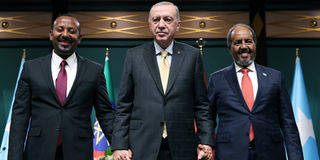Somali delegation in Ethiopia to cement Ankara deal

Turkish President Tayyip Erdogan poses with Somali President Hassan Sheikh Mohamud (right) and Ethiopian Prime Minister Abiy Ahmed following a press conference in Ankara, Turkey, on December 11, 2024.
What you need to know:
- Somalia considers Somaliland its territory.
A Somali delegation led by the Minister of Foreign Affairs and International Cooperation, Ali Omar Fiqi, on Tuesday arrived in the Ethiopian capital Addis Ababa for an official working visit.
It is the first such open trip since the two sides began talks on a controversial memorandum of understanding that had soured relations.
The visit comes about two weeks after Ethiopia and Somalia agreed to end their bitter dispute over Addis Ababa’s plans to build a port in the breakaway republic of Somaliland following talks in Turkey.
Somalia considers Somaliland its territory.
Turkish President Recep Tayyip Erdogan hailed the deal as a “historic agreement” and said it would eventually secure landlocked Ethiopia’s access to the sea.
President Erdogan further hoped that the deal would be “the first step towards peace and cooperation” between the two countries.
In a statement, the Somali Foreign Ministry said the delegation was heading to Addis Ababa “to strengthen the commitments made in the Ankara Agreement.”
“The visit will reinforce Somalia’s commitment to strengthening bilateral relations with Ethiopia, based on the agreement reached by the leaders of both countries in Ankara,” the statement said.
“This visit highlights Somalia’s commitment to fostering mutual respect and cooperation with Ethiopia,” the statement added.
Somalia said it remained committed to fostering “robust relations with neighbouring countries, firmly anchored on the principles of sovereignty, unity, and territorial integrity.”
“The delegation will focus on exploring transformative opportunities to cultivate a partnership founded on mutual respect, common interest, and cooperation.”
After the declaration was signed by Somali President Hassan Sheikh Mohamud and Ethiopian Prime Minister Abiy Ahmed, both sides said they would continue to respect each other’s territorial integrity and sovereignty.
They also gave technical teams until February to work out alternative commercial arrangements for Ethiopia’s access to the sea.
Their dispute had attracted regional and global attention. During his one-day official visit to Ethiopia two days ago, French President Emmanuel Macron expressed his support for Ethiopia’s efforts to gain access to the sea through dialogue with neighbouring countries and in a manner that respects international law.
In Ankara, the Turkish President had said that the deal would provide landlocked Ethiopia with a sea gateway.
According to the declaration, Ethiopia and Somalia will work closely to establish a trade and bilateral agreement that will allow Ethiopia to have “safe, secure, and sustainable maritime access under the sovereign jurisdiction of Somalia.”
Ethiopian Prime Minister Abiy Ahmed indicated that the talks have helped resolve the dispute between Somalia and Ethiopia over the past year.
“Ethiopia’s desire to gain access to the sea is a peaceful endeavour that also benefits our neighbours. This desire should not be viewed with suspicion, but with a spirit of cooperation,” he said.
The Prime Minister added that “constructive dialogue” will move Ethiopia and Somalia “into the next year with a willingness to work together, not in cooperation, friendship or hostility.”
Tensions between Ethiopia and Somalia, which had started to become a source of tension in the Horn of Africa region, were sparked after Ethiopia signed an agreement with Somaliland, a breakaway region of Somalia, to gain access to its coastline.




